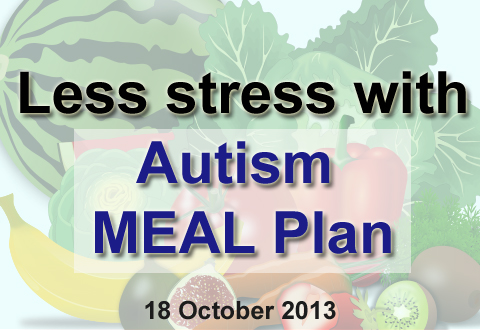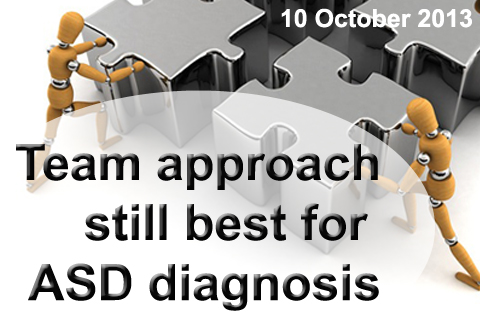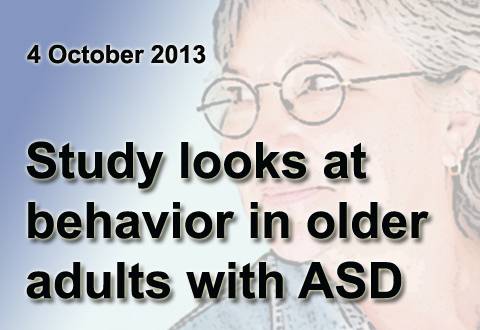Archives
October, 2013
Select a different month in the archive
Parent Training May Improve Autistic Children’s Diet
By Chelsea E. Toledo, M.A. on October 18, 2013

Background: Anecdotal evidence demonstrates that children with Autism Spectrum Disorder (ASD) often have problems maintaining a regular diet, and studies suggest that this population is at a greater risk for nutritional issues—including vitamin deficiencies, poor bone growth, and obesity.
What’s New: On October 7, 2013, the journal Autism published a pilot study evaluating a curriculum for parents to address feeding issues in children with ASD. The program, called the Autism MEAL Plan, was administered over eight training sessions and covered behavior management strategies, specific interventions for ASD-associated feeding issues, and tactics to promote self-feeding. 30 families began the study, completing a series of evaluations to assess dietary issues, general health, and stress experience by parents. Of the 19 families continuing on with the study, 10 completed Autism MEAL Plan training, reporting a significant reduction in parental stress as compared to the control group. However, no significant differences between groups existed regarding feeding behaviors and dietary variety following the intervention.
Why it’s important: This study provides preliminary evidence to support parental training programs for the sake of improving meal time for children with ASD. However, because so few families participated, further research is needed to provide conclusive results.
Help me understand :
| Source(s) : |
| Tweet |
Team Approach Still Gold Standard for ASD Diagnosis
By Shana R. Spindler, Ph.D. on October 10, 2013

Background: A multidisciplinary approach that incorporates clinical evaluations and behavioral observations has been the gold standard for Autism Spectrum Disorder (ASD) diagnosis. Given the cost and time associated with multiple evaluations, researchers are investigating if a lean model of diagnosis that utilizes fewer assessments can diagnose ASD equally well.
What’s new: Researchers at the Gillberg Neuropsychiatry Centre in Gothenburg, Sweden, designed a study to find which autism assessments best diagnose ASD or if a multidisciplinary approach is still needed. The researchers compared independent assessments for 34 children age 24 to 46 months using psychiatric evaluation, Griffiths’ Developmental Scales, language assessment, the Diagnostic Interview for Social and Communication disorders (DISCO), the Autism Diagnostic Observation Schedule (ADOS), and preschool/home observation. After completion of the independent assessments, the clinicians held a diagnostic case conference for each child to deliver a final diagnosis.
Of the six assessments examined in the study, the most informative was the preschool/home observation, while the psychiatric evaluation matched poorest with the final diagnosis. No single assessment type was perfect, and this especially held true for female children. Based on the poor agreement between individual assessments, the researchers suggest that a comprehensive clinical evaluation should remain the gold standard for ASD diagnosis.
Why it’s important: Families and insurance providers rely on studies like these to determine which diagnostic assessments are necessary for proper care. Given the findings in this study, a comprehensive evaluation that utilizes multiple assessment types likely offers the best care to date.
Help me understand :
| Source(s) : |
| Tweet |
Study Examines Behavior in Older Adults with ASD
By Chelsea E. Toledo, M.A. on October 4, 2013

Background: Autism spectrum disorder (ASD) has been studied extensively in children, and is now estimated to affect one in every 88. However, relatively few have examined adults with the condition.
What’s New: On September 25, 2013, a study was published in the Journal of Neurodevelopmental Disorders evaluating the prevalence of clinical problems in older adults with both ASD and intellectual disabilities. Using surveys administered across states between 2009 and 2011, the researchers evaluated more than 10,000 cases of intellectual disability in adults between the ages of 30 and 59. They found that about 8 percent of study participants had ASD, and that those with both ASD and intellectual disabilities were about twice as likely—at about 50 percent—to engage in self-harm, disruptive, and destructive behaviors than their counterparts without ASD.
Why it’s important: This study demonstrates the need for more research focusing on adults with ASD, whose population is increasing.
Help me understand :
| Source(s) : |
| Tweet |

